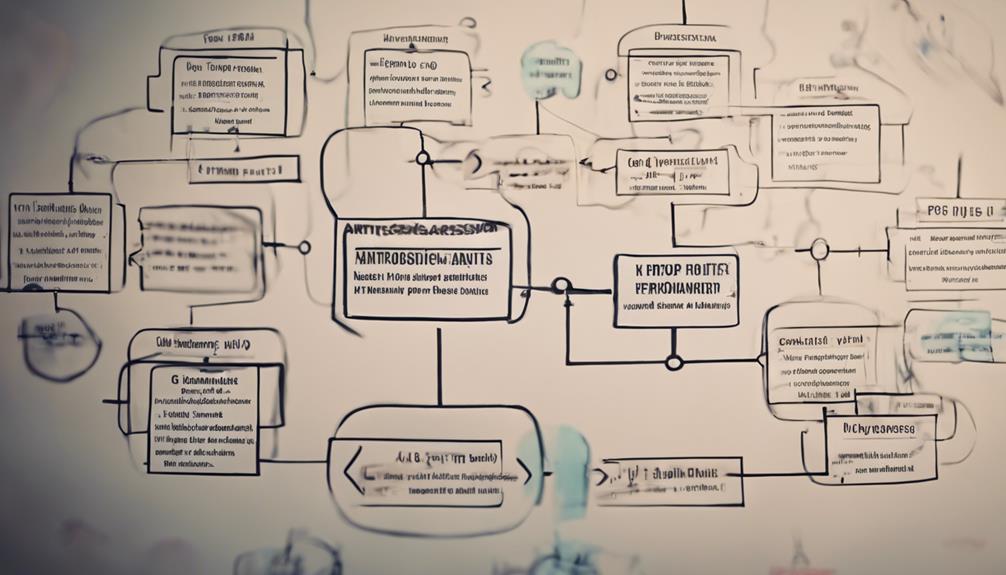To diagnose Narcissistic Personality Disorder, mental health professionals conduct clinical interviews and observe behavior closely. Traits like grandiosity and lack of empathy are key indicators. Psychological tests like the NPI help differentiate NPD from other disorders. Evaluating against DSM-5 criteria, such as needing admiration, aids in accurate diagnosis. Considering differential diagnoses like Borderline Personality Disorder ensures precision. Collaboration with psychiatrists is crucial for a holistic approach to assessment. This strategic method combines observation, psychological tests, and criteria evaluation for a thorough diagnosis and effective treatment. Discover more about the steps to diagnosing NPD.
Key Takeaways
- Conduct clinical interviews and observations to assess symptoms and behavior patterns.
- Utilize standardized psychological assessments like NPI and MCMI.
- Evaluate behaviors against DSM-5 criteria including grandiosity and lack of empathy.
- Consider differential diagnoses with disorders like Borderline and Antisocial Personality Disorders.
- Collaborate with mental health professionals for accurate diagnosis and tailored treatment planning.
Clinical Interviews and Observation
When conducting clinical interviews and observation to diagnose Narcissistic Personality Disorder (NPD), mental health professionals carefully assess symptoms and behavior patterns. Through these interactions, professionals aim to identify key traits associated with NPD, such as grandiosity, lack of empathy, and an excessive need for admiration. By delving into the individual's observable behaviors and responses to specific questions aligned with the DSM-5 criteria, clinicians can gain valuable insights into the presence of narcissistic traits.
During clinical interviews, mental health professionals pay close attention to verbal and non-verbal cues, tone of voice, and expressions that may indicate underlying narcissistic tendencies. By combining these observations with structured questioning, clinicians can form a more accurate diagnosis of Narcissistic Personality Disorder. The need for a holistic approach that integrates both verbal responses and observable behaviors is essential in unraveling the complexities of NPD and providing effective treatment strategies.
Psychological Testing and Assessment

Utilizing standardized assessments and interviews, mental health professionals employ psychological testing to evaluate symptoms associated with Narcissistic Personality Disorder (NPD). This process involves using assessment tools such as the Narcissistic Personality Inventory (NPI) and the Millon Clinical Multiaxial Inventory (MCMI) to gain insights into specific behaviors, attitudes, and interpersonal patterns commonly seen in individuals with NPD.
By analyzing these assessments, professionals can differentiate NPD from other personality disorders and determine the significance of symptoms present. The results obtained from psychological testing play an important role in helping mental health professionals formulate an accurate diagnosis and develop personalized treatment plans tailored to the individual's needs.
This detailed evaluation aids in understanding the nuances of NPD and guides the therapeutic approach towards addressing the specific challenges associated with this complex personality disorder.
DSM-5 Criteria Evaluation

Moving from the focus on psychological testing and assessment, our attention now shifts to the evaluation of Narcissistic Personality Disorder (NPD) based on the DSM-5 criteria. When diagnosing NPD, mental health professionals rely on the DSM-5 criteria, which outline specific symptoms like grandiosity, the need for admiration, and a lack of empathy.
To confirm a diagnosis of NPD, at least five out of the nine criteria must be present in the individual being evaluated. These criteria offer a standardized framework that helps guarantee an accurate diagnosis of NPD.
Evaluating a patient for NPD involves a thorough assessment of their behaviors and traits to match them against the DSM-5 criteria. By meeting these criteria, mental health professionals can provide a clear diagnosis of Narcissistic Personality Disorder and recommend tailored treatment approaches.
Understanding and applying the DSM-5 criteria are pivotal steps in accurately diagnosing NPD and addressing the individual's specific needs.
Differential Diagnosis Considerations

Taking into account comorbid conditions like mood disorders and substance use disorders is essential during the diagnostic process of Narcissistic Personality Disorder (NPD). When considering the possibility of NPD, it's vital to differentiate it from other personality disorders. Here are some key points to keep in mind:
- Borderline Personality Disorder: Contrary to NPD, individuals with Borderline Personality Disorder often struggle with unstable relationships, self-image, and emotions.
- Antisocial Personality Disorder: While both disorders may exhibit manipulative behaviors, individuals with Antisocial Personality Disorder tend to disregard and violate the rights of others more blatantly.
- Grandiosity, Lack of Empathy, Need for Admiration: These are hallmark traits of NPD that set it apart from other personality disorders.
- Comorbid Conditions: Mood disorders and substance use disorders commonly co-occur with NPD, necessitating a thorough assessment for accurate diagnosis.
- Accurate Diagnosis and Treatment Planning: Understanding the unique characteristics of NPD is crucial for effective treatment strategies tailored to the individual's specific needs.
Collaboration With Mental Health Professionals

When moving forward to discuss collaboration with mental health professionals in diagnosing Narcissistic Personality Disorder, it's important to recognize their integral role in the diagnostic process. Psychiatrists and clinical psychologists play a vital part in evaluating individuals for NPD. Through methods like clinical interviews and testing, these professionals assess symptoms and criteria as outlined in the DSM-5, providing a thorough evaluation.
By seeking assistance from these qualified professionals, individuals gain access to accurate diagnosis and appropriate treatment planning tailored to their specific needs. Additionally, online platforms like Talkspace offer convenient options for evaluation, making mental health support more accessible. This collaboration ensures a detailed assessment of NPD, leading to effective intervention strategies.
Working closely with mental health experts throughout the diagnostic process can help individuals navigate the complexities of NPD diagnosis and establish a pathway towards improved well-being.
Frequently Asked Questions
How Do You Self Diagnose Narcissism?
We strongly advise against self-diagnosing narcissism. Due to the complexity of Narcissistic Personality Disorder (NPD), it's important to seek a professional evaluation for an accurate diagnosis.
Online quizzes can't substitute a thorough assessment by a mental health expert. NPD symptoms may overlap with other conditions, complicating self-diagnosis.
To get a proper evaluation of narcissistic traits, seeking help from a psychiatrist or psychologist is essential.
How Do You Diagnose Narcissistic Personality?
When diagnosing narcissistic personality, mental health professionals evaluate symptoms like grandiosity, lack of empathy, and need for admiration. Clinical interviews and assessment tools help determine if the DSM-5 criteria are met for NPD.
Comorbid conditions can complicate the process, so seeking help from professionals is essential for accurate diagnosis and treatment planning. Remember, a thorough evaluation is necessary to understand the complexities of this personality disorder.
What Are the DSM 5 Criteria for Narcissistic Personality Disorder?
The DSM-5 criteria for Narcissistic Personality Disorder include:
- Grandiosity
- Need for admiration
- Lack of empathy
- Entitlement
- A sense of superiority
Diagnosis requires at least five out of nine criteria, such as fantasies of success and exploiting others.
Mental health professionals use these criteria to accurately diagnose NPD. It's crucial to recognize these traits for effective treatment and support.
Understanding the criteria helps in identifying and addressing NPD in individuals.
How Do You Make a Narcissist Realize They Are Wrong?
When dealing with a narcissist, making them realize they're wrong can be challenging. We should approach discussions calmly, provide clear evidence, and set boundaries. Narcissists may deflect blame, gaslight, or use manipulation tactics.
Encouraging self-reflection, empathy-building exercises, and therapy can help them acknowledge and address their wrong behaviors. It's important to navigate these situations with patience and understanding while maintaining our own boundaries.
Conclusion
To sum up, diagnosing narcissistic personality disorder requires a thorough evaluation through clinical interviews, psychological testing, and criteria evaluation. Collaboration with mental health professionals is essential for an accurate diagnosis.
But remember, understanding narcissism goes beyond just ticking off symptoms. It's about recognizing the complex interplay of thoughts, emotions, and behaviors.
So, next time you encounter someone who may exhibit narcissistic traits, ask yourself: what lies beneath the surface?










